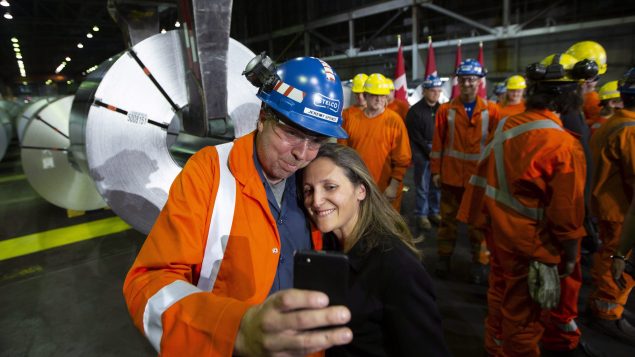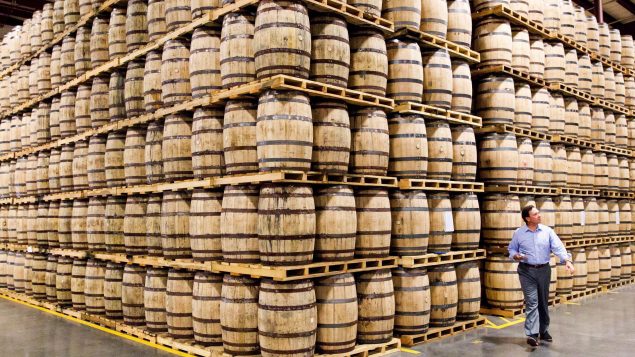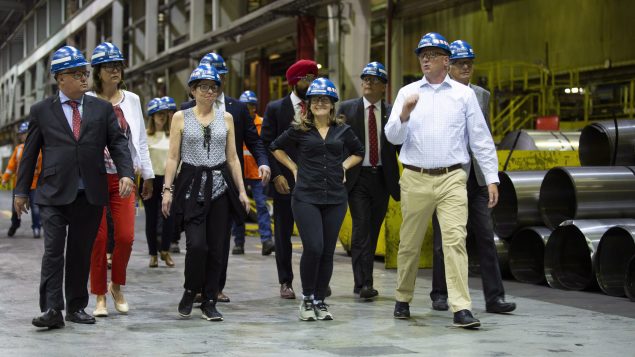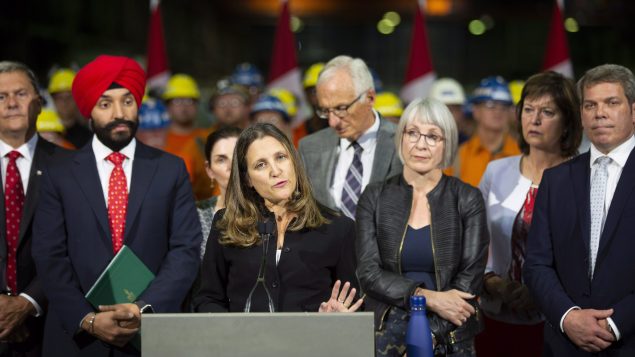The federal government unveiled Friday an updated list of U.S. products subject to Canadian retaliatory tariffs as of July 1 while also pledging to spend up to $2 billion to protect Canada’s steel, aluminum and manufacturing industries and workers.
Flanked by cabinet colleagues and a handful of Liberal MPs, Foreign Affairs Minister Chrystia Freeland revealed the final list of $16.6-billion worth of retaliatory tariffs on a wide range of U.S. products, including steel and aluminum at an event at a steel factory in Hamilton, Ontario.
“Canada’s approach is and will be this – we will not escalate and we will not back down,” Freeland said, speaking at the Stelco steel plant. “I cannot emphasize enough the regret with which we take these countermeasures. We are acting very much in sorrow, not in anger.”
The U.S. tariffs leave Canada no choice but to defend its industries and workers, Freeland said.
Eclectic list of products

Jeremy Spence, an area manager in cold rolling at Stelco, does a selfie with Chrystia Freeland, Minister of Foreign Affairs, visited Stelco in Hamilton, ON on Friday, June 29, 2018. Freeland met with employees in the cold rolling plant and announced the government’s latest efforts in response to US tariffs on Canadian steel and aluminum. (Peter Power/THE CANADIAN PRESS)
The announcement came nearly a month after Freeland and Prime Minister Trudeau presented the initial list of U.S. products, pledging to consult with Canadians and industry to fine-tune it.
- Canada hits back at U.S. steel and aluminum tariffs with $16.6B countermeasures
- Steelmakers press Ottawa to slap tariffs on U.S. steel immediately
With a few notable tweaks, the updated list released on Friday kept most of the products in the initial version.
It targets U.S. exports of steel and aluminum with 25 and 10 per cent tariffs, as well as levying a 10 per cent duty on a wide range of other products, including coffee, ketchup and maple syrup, bourbon whiskey, as well as household appliances, mattresses and bedding.
“Where possible, we have sought to put products on the list that can be easily sources from either Canadian or non-U.S. suppliers,” Freeland said.

FILE – In this Aug. 14, 2014 file photo, a Diageo employee walks by barrels of whiskey stored in a new warehouse at the George Dickel distillery near Tullahoma, Tenn. Producers of Kentucky bourbon and Tennessee whiskey will be hit by a 10-per-cent Canadian duty in retaliation for U.S. duties on Canadian steel and aluminum imposed by the U.S. government. (Erik Schelzig/AP Photo/File)
The list is also designed to inflict maximum political pain on the Trump administration by targeting industries in key electoral districts.
For example, chocolate is on the final list. As it turns out the Republican congressman for Hershey, Pennsylvania, home of the Hershey chocolate brand, is retiring and that’s an open seat that Republicans can lose.
Following intensive consultations, Ottawa added some items, such as cast-iron grills, refrigerator-freezers and pillows, to the list and removed others: steel and iron beer kegs and prepared mustard (it turns out that while Canada is the world’s largest producer of mustard seed, there aren’t enough Canadian manufacturers of prepared mustard to satisfy the country’s demand).
Help for the industry and workers

Chrystia Freeland, Minister of Foreign Affairs, visited Stelco in Hamilton on Friday, June 29, 2018. (Peter Power/THE CANADIAN PRESS)
Freeland, Innovation Minister Navdeep Bains, and Employment and Labour Minister Patty Hajdu also announced that the Liberal government’s $2-billion offer of assistance to the steel and aluminum industries also includes:
-
- Adding 38 weeks on to the duration of work-sharing agreements under the Employment Insurance program to avoid layoffs;
- Increasing funding to Canada’s 10 provinces and three territories for job training programs available to workers impacted;
- Providing liquidity support to businesses;
- Up to $250 million to boost competitiveness and integrate the Canadian steel and aluminum supply chain through the Strategic Innovation Fund; and
- $50 million over five years for Canadian companies to diversify exports through CETA and CPTPP free trade agreements, including new “export readiness” grants.
According to statistics released by the federal government, Canada’s steel and aluminum industries employ 23,000 and 10,500 workers respectively. The two industries contributed $8.9 billion to the country’s GDP in 2017.
‘Ready for pretty much anything’

Chrystia Freeland, Minister of Foreign Affairs, visited Stelco in Hamilton on Friday, June 29, 2018 where she met with employees in the cold rolling plant and announced the government’s latest efforts in response to US tariffs onCanadian steel and aluminum. (Peter Power/THE CANADIAN PRESS)
Canada’s retaliatory tariffs will remain in effect as long as the U.S. tariffs on Canada stay in place, Freeland said.
Canada is taking the retaliatory measures in “very close collaboration” with partners in the European Union and Mexico who have also been targeted with the same U.S. tariffs, she said.
When asked what will happen if the Trump administration retaliates back with more tariffs against Canada’s auto industry, Freeland said it would be absurd for the U.S. to impose tariffs on Canadian auto industry based on Section 232 of the Trade Expansion Act of 1962 on the grounds of national security.
The White House had used the same article to justify tariffs on imports of steel and aluminum from Canada, the EU, and Mexico.
“It is absurd to consider that Canadian steel and aluminum could pose a national security threat, how much even more absurd it is to suggest that car parts made in Canada to go into a car manufactured in the United States, which may be very well sold back to a Canadian, that those car parts could be a security threat,” Freeland said.
She warned that the ramping up of the trade war will be painful for both highly integrated economies.
“I think that is an issue where it is absolutely imperative that common sense should prevail,” Freeland said. “Having said that, our approach from day one of NAFTA negotiations has been to hope for the best but to prepare for the worst… We’re ready really for pretty much anything.”
With files from CBC News







For reasons beyond our control, and for an undetermined period of time, our comment section is now closed. However, our social networks remain open to your contributions.